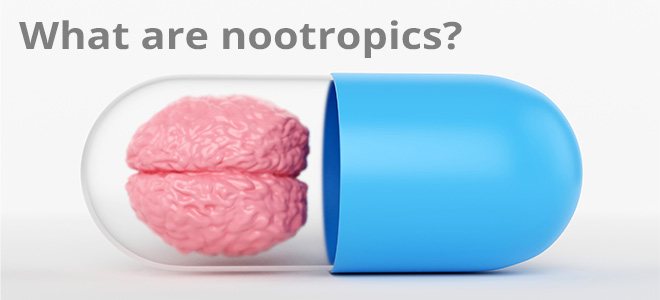
Derived from Ancient Greek, with noos meaning ‘mind’ and trope meaning ‘a turning’, nootropics have been around for centuries to optimise brain health. These compounds are said to improve cognitive function and achieve that magical – albeit elusive – feeling of ‘flow’. In an era of burnout and mental fatigue, it's not surprising people are becoming more interested in nootropics'

What are nootropics?
Nootropics are a unique family of compounds that support different areas of cognitive function and brain health. They work by increasing mental function, including creativity, memory, and concentration (1).
Nootropics sit into two camps: natural-occurring compounds and lab-crated prescription medication. When we talk about nootropics, we’re referring to the plants, herbs, and phytonutrients that have extraordinarily natural brain-loving properties. Although some synthetic substances are also known as nootropics, we’re just going to focus on supplements derived from plant-based materials.
How do nootropics work?
Nootropics are pretty mind-blowing compounds. They serve as a vasodilator against the small arteries and veins in the brain, increasing blood circulation, energy, and oxygen flow (2).
Every nootropic affects the brain uniquely. Some increase mental sharpness, cognitive flexibility, brain longevity, and neuroplasticity, while others affect neurotransmitter balance and nerve health (3).
Are nootropics safe?
Naturally occurring, plant-based nootropics rooted in science are generally well-tolerated in healthy adults aged 16 and over. However, it’s important to be mindful that everyone is unique; some people may be more sensitive to certain nootropic ingredients. With this in mind, you may wish to chat with your health practitioner or GP before adding them to your supplement regime.
Whether you want to enhance your cognitive performance, protect your smarts in the long run, or simply get your head in the game, there’s a very compelling case to suggest nootropics can provide targeted brain health support.
Inspired by these fascinating compounds, we’ve formulated Curcumem™, which comprises high-strength turmeric, lutein, vitamin B12, and zinc to support cognitive function.
Types of nootropics
Although the term ‘nootropics’ feels somewhat new-agey, humans have always harnessed the power of these plants. Take adaptogens, for example, which have been widely used in Chinese and Ayurvedic medicine for thousands of years.
Adaptogens are believed to support overall cognitive function, as well as help the body manage mental and physical stress. Gingko Biloba, ashwagandha, Siberian ginseng and Korean ginseng are some examples of these supercharged botanicals found to have neuroprotective properties (4).
Certain phytonutrients also have nootropic and apoptogenic qualities, most notably L-theanine. A natural constituent in tea, this compound is said to alter alpha brain wave activity, which may encourage a focused yet relaxed mental state (5). (Just think of that lovely cup of tea feeling.)




